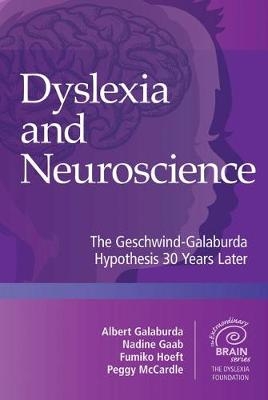
Dyslexia and Neuroscience
Brookes Publishing Co (Verlag)
978-1-68125-225-4 (ISBN)
- Titel z.Zt. nicht lieferbar
- Versandkostenfrei innerhalb Deutschlands
- Auch auf Rechnung
- Verfügbarkeit in der Filiale vor Ort prüfen
- Artikel merken
This 15th volume in the Extraordinary Brain Series is focused on research in dyslexia and neuroscience in response to the Geschwind-Galabura hypothesis that defined the field of dyslexia 30 years ago. In the 1980s, Norman Geschwind and Peter Behan reported increased prevalence of left-handedness and autoimmune disorders in individuals and families with developmental dyslexia. Following this report, Geschwind, in collaboration with Albert Galaburda, wrote a paper in the Archives of Neurology discussing developmentally relevant associations between brain development, hormones, immune activity, and brain lateralization, which resulted in human diversity in talents and disabilities. There have been many technological advances in laboratory science, neuroimaging, genetics, and behavioral science in the last 30 years. Still, many of the questions and issues raised in this landmark paper have not been definitively addressed. Invited attendees of the 2016 Extraordinary Brain Symposium (hosted by The Dyslexia Foundation) revisited the hypothesis and assessed what remains to be investigated; this book is based on the attendees' Symposium presentations.
Albert M. Galaburda, M.D., is a cognitive neurologist at Beth Israel Deaconess Medical Center and, since 1995, the Emily Fisher Landau Professor of Neurology (Neuroscience) at Harvard Medical School. In addition, he serves as Director, Office of Diversity, Inclusion, and Career Advancement at BIDMC and as Co-director, Mind, Brain, and Behavior Interfaculty Initiative at Harvard University. Dr. Galaburda is a native of Chile and a graduate of Boston University's Six-year Liberal Arts-Medicine Program (1971). After medical school he trained in Internal Medicine and in Neurology at Boston City Hospital (now Boston Medical Center). From 1979 until 2015, he directed a NIH-funded bench laboratory on the fundamental causes of learning disorders, especially language based learning disabilities, and from 1992 until 2015, he directed the Division of Cognitive Neurology at BIDMC. He has written extensively on cerebral lateralization and on dyslexia. He has published more than 230 original articles, reviews, book chapters and books, and has lectured extensively locally, nationally and abroad on the general field of cognitive neurology. He has also been recognized for his work with several prizes, including the Pattison Prize in Neuroscience, the IPSEN Prize in Neural Plasticity, the American Academy of Neurology Decade of the Brain keynote speaker award, the Behavioral Neurology Society of the AAN's Lifetime Achievement Award, the International Dyslexia Association's Samuel T. Orton Award, and others. Since January of 2015, Dr. Galaburda devotes half of his time to diversity and inclusion, as well as the career advancement of students and physicians underrepresented in medicine. Nadine Gaab, Ph.D., Associate Professor of Pediatrics, Boston Children's Hospital/Harvard Medical School, Department of Medicine/Division of Developmental Medicine, Laboratories of Cognitive Neuroscience, 1 Autumn Street, Boston, Massachusetts 02115. Nadine Gaab is an associate professor of pediatrics at Boston Children's Hospital/Harvard Medical School and a faculty member at the Harvard Graduate School of Education. Her current research focuses on auditory and language processing in the human brain and its applications for the development of typical and atypical language and literacy skills. The Gaab Lab is currently working on various topics with a main focus on early identification of developmental dyslexia in the prereading and infant brain. The Gaab Lab employs cross-sectional and longitudinal study designs and works closely with more than 20 private and public schools within the greater New England area. Fumiko Hoeft, Ph.D., Director, Laboratory for Educational Neuroscience, and Associate Professor, Department of Psychiatry, University of California, 401 Parnassus Avenue, Box 0945-F, San Francisco, CA 94143. Dr. Hoefta (TM)s research focuses on circuit-based approaches to the understanding of reading and dyslexia. She is particularly interested in the neurobiological basis of different phenotypes/subtypes of dyslexia and early risk factors that predispose and protective factors that prevent children from developing dyslexia. Peggy McCardle, Ph.D., M.P.H., Owner, Peggy McCardle Consulting, LLC Peggy McCardle is a private consultant and an affiliated research scientist at Haskins Laboratories. She is the former chief of the Child Development and Behavior Branch of the Eunice Kennedy Shriver National Institute of Child Health and Human Development (NICHD), U.S. National Institutes of Health, where she also directed the Language, Bilingualism, and Biliteracy Research Program and developed various literacy initiatives. Dr. McCardle is a linguist, a former speech-language pathologist, and, in her remote past, a classroom teacher. Her publications address various aspects of public health and developmental psycholinguistics. The recipient of various awards for her work in federal government, including a 2013 NICHD Mentor Award, she also was selected in 2013 to receive the Einstein Award from The Dyslexia Foundation. Her publications address various aspects of public health and developmental psycholinguistics (e.g., language development, bilingualism, reading, learning disabilities) . Dr. McCardle has taught scientific and technical writing and has extensive experience developing and coediting volumes and thematic journal issues.
| Erscheinungsdatum | 03.02.2018 |
|---|---|
| Reihe/Serie | Extraordinary Brain |
| Verlagsort | Baltimore |
| Sprache | englisch |
| Maße | 154 x 231 mm |
| Gewicht | 450 g |
| Themenwelt | Geisteswissenschaften ► Psychologie ► Entwicklungspsychologie |
| Geisteswissenschaften ► Psychologie ► Verhaltenstherapie | |
| Medizin / Pharmazie ► Medizinische Fachgebiete ► Neurologie | |
| Naturwissenschaften ► Biologie ► Humanbiologie | |
| Naturwissenschaften ► Biologie ► Zoologie | |
| Sozialwissenschaften ► Pädagogik | |
| ISBN-10 | 1-68125-225-2 / 1681252252 |
| ISBN-13 | 978-1-68125-225-4 / 9781681252254 |
| Zustand | Neuware |
| Haben Sie eine Frage zum Produkt? |
aus dem Bereich


